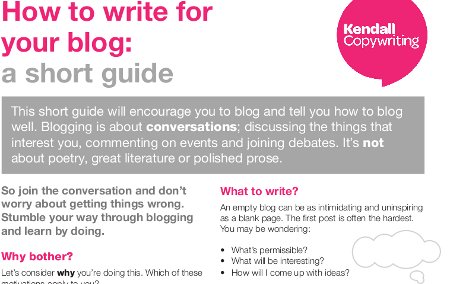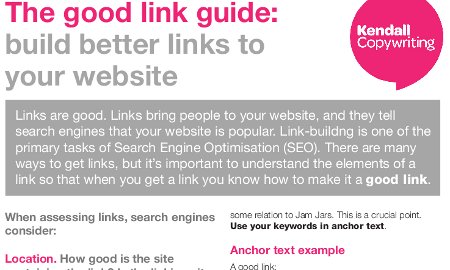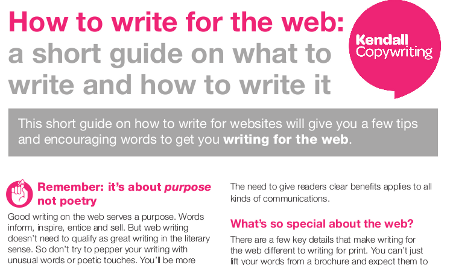Are you a budding blogger? If you’re looking for inspiration or a steer in the right direction, check out How to write for your blog: a short guide (link opens a lovingly-designed PDF in a new tab. Why not print it out and read it later?).
It’s very short and totally free.
Or you can read it all here:
How to write for your blog: a short guide
This short guide will encourage you to blog and tell you how to blog well. Blogging is about conversations: discussing the things that interest you, commenting on events and joining debates. It’s not about about poetry, great literature or polished prose.
So join the conversation and don’t worry about getting things wrong. Stumble your way through blogging and learn by doing.
Why bother?
Let’s consider why you’re doing this. Which of these motivations apply to you?
I want to:
- Promote my business.
- Reflect on my personal development.
- Announce my news.
- Share discoveries.
- Placate my boss.
- Own my corner of the web.
- Improve my website’s Search Engine Optimisation (SEO).
- Get recognition for my work.
- Connect with my customers online.
- Open up to customer feedback.
Conversational communications
Blogging is different from traditional media (like newspapers or TV) because the web allows everyone to be reporters, commentators and photographers.
So how can you hold a conversation on the web?
- Invite comments from your readers.
- Respond to comments.
- Freely link to relevant blog posts.
- Comment on other bloggers’ posts.
What to write?
An empty blog can be as intimidating and uninspiring as a blank page. The first post is often the hardest. You may be wondering:
- What’s permissible?
- What will be interesting?
- How will I come up with ideas?
Deciding what’s right to write about
The subject or focus of your blog may change over time and that’s absolutely fine. As you write, you’ll learn what you enjoy writing about and what your audience enjoys reading.
Why you don’t have to know it all
Bloggers don’t have to be the world’s foremost authority on a subject in order to write about it. Blogging is about discovery and exploration as much as it’s about sharing knowledge.
Where do ideas come from?
You may have to force your imagination to produce ideas, but that’s perfectly normal.
Try brainstorming ideas with a friend. Look at other blogs for inspiration. Create a list – something like The Top 10 Tricks for Y. Turn your list into a series, turning one post into ten.
Why not write about:
- A book you’ve read.
- A problem you’ve solved.
- A question you can’t answer.
- Something that inspires you.
- What motivates you.
- A recent project.
- A favourite client.
- A current dilemma.
Scheduling
How often will you blog? It’s a good idea to set a target. If you’re starting out, aim for one post per week, as a minimum. Twice a week is better. Once you have a list of blog post titles or rough ideas, outline a schedule for posting. Tell your readers when you will be posting, and don’t let them down!
How to write for your blog
Luckily, human communication has stepped out of the linguistic manacles we were burdened with at school. Here are some old-school rules you can forget:
- Split infinitives. What’s a split infinitive? It doesn’t matter.
- Contractions. Words like: can’t, don’t, shouldn’t. Contractions give your writing a conversational feel, so use them.
- Repeating words. If you’re writing about computer networks (for example), it’s okay to repeat the words computer networks.
- Starting sentences with ‘and’ or ‘because’. Because it’s okay to do this.
What’s the point?
The best way to start writing a blog post is by defining your purpose. Answer the questions:
- What am I trying to say?
- Who am I writing this for?
- What do I want to achieve?
Remember your reader
Be nice to your reader. Think about them as you write, because you’re doing this for them.
- Write a blog post, then leave it overnight and review it in the morning. You’re more likely to spot mistakes after a night’s sleep.
- Use sub-headings to break up the text. Sub-headings make screen reading a little bit easier and they help hurried readers scan your text.
- Use a spell-checker.
- Ask a friend to read your blog posts to check spelling, grammar and the existence of a point.
The Internet: nothing to fear
Some people worry about the reaction their blog posts will receive. Don’t worry: as long as you write informative, useful blog posts in a friendly, considerate way, you’ll receive friendly, polite responses.
Links
Hyperlinks, or links (the clickable text that leads you from one web page to another) are one of the web’s defining features. Use links to provide evidence for your claims, support for your argument or additional resources for your readers.
Writing makes you a better writer
I hope this brief guide has encouraged you to start writing. With any kind of writing, the only way to improve is to write.
Key points:
- Blogging is conversational so write as you would speak and be open to comments from your readers.
- Schedule your blog posts and blog regularly.
- It’s okay to split infinitives, use contractions and repeat words.
- Use short sentences and headings to make your writing easier to read on screen.
- Ask someone to read your posts before you publish them and use a spell-checker.
- Don’t be afraid of making mistakes: become a better blogger by blogging!









